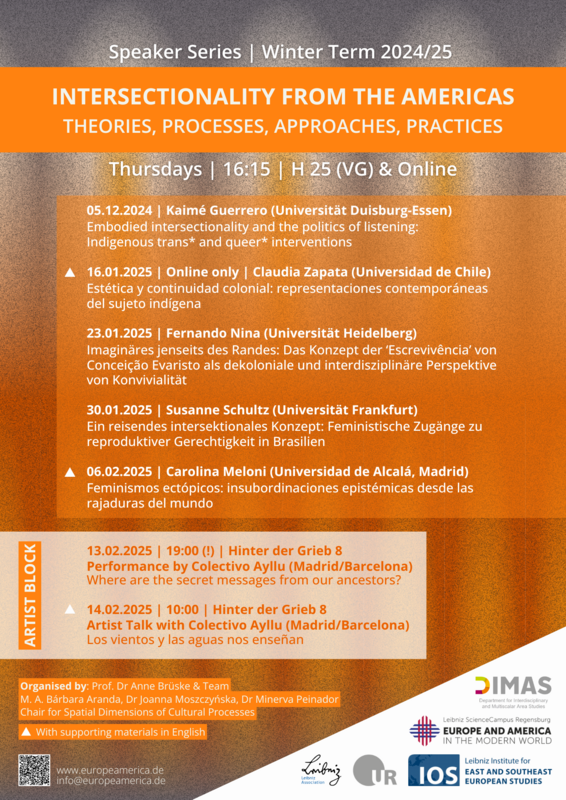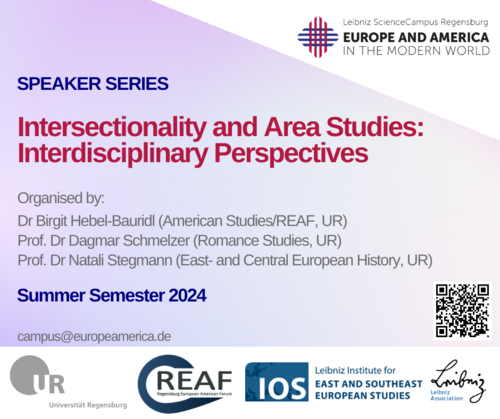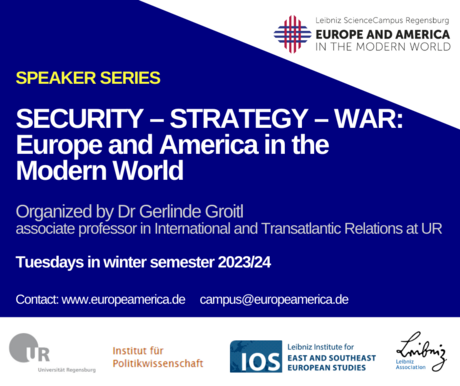The ScienceCampus organizes and collaborates on regular Speaker Series. The discussions featuring invited guests and experts from Regensburg take up themes that have a strong social relevance while also shapring the research emerging within the ScienceCampus. An overview of the series organized so far is available below.
Winter Semester 2025/26 | Margins of Memory: Speaker Series
The Margins of Memory Speaker Series runs throughout the winter semester 2025/26. It is organized by Tatiana Klepikova and Volha Bartash, the co-spokespeople of the Margins of Memory Early Career Research Network supported by the ScienceCampus. All events take place at Landshuter Str. 4 (Altes Finanzamt / IOS / Graduate School) in Room 017. The events are free and open to all. Find out more about the Margins of Memory network here.
Please click on the titles to find out more about each event. Download the poster here.
All events take place at Landshuter Str. 4 (Altes Finanzamt / IOS / Graduate School) in Room 017.
- Fri 21 Nov | 10:15 | Martin Fotta (Czech Academy of Sciences, Prague)
From Massacre to Miracle: Romani Presence and the Making of a Pilgrimage Site in Piaui, Brazil- At 14:00 on 21 November, there will be a discussion with Martin Fotta and Volha Bartash on applying for ERC grants.
- Thu 11 Dec | 16:15 | Lilia Topouzova (University of Toronto)
Unsilencing: The History and Legacy of the Bulgarian Gulag (book launch) - Fri 19 Dec | 10:15 | Eve Rosenhaft (University of Liverpool)
Researching and Remembering Black(-and-White) Holocaust Victims: Reflections from a New Book Project - Tue 13 Jan | 16:15 | Sebastien Tremblay (Europe-University Flensburg)
A Badge of Injury: Pink Triangle and Queer Memories of National Socialism
Past Speaker Series
Intersectionality from the Americas: Theories, Processes, Approaches, Practices

This series will take place throughout the winter semester 2024/25. Supported by the ScienceCampus, the series organised by Prof. Anne Brüske with Dr Minerva Peinador, Bárbara Aranda and Dr Joanna Moszczyńska of DIMAS. It will feature talks, a workshop and an artistic performance. An information event for interested students took place on Thursday, 21 November, at 16:15 in H 25 (Vielberth building). Find the flyer about the event here.
Abstract
The lecture series invites participants to engage in conversations, discussions, and explorations of intersectionality through the lens of Area Studies, with a focus on Spanish and Portuguese-speaking regions, particularly Latin America. Throughout a variety of presentations, the series aims to delve into different visions of intersectionality by embracing intercultural dialogue and shedding light on inequalities, forms of discrimination, and challenges facing the region today.
Drawing on a broad spectrum of literary studies, social sciences, and gender studies, among others, the lecture series offers a comprehensive understanding of different perspectives on intersectionality. By emphasizing the importance of different loci of enunciation, it seeks to foster a nuanced dialogue that respects and acknowledges different points of view.
Overall, the lecture series aims to raise awareness among students, scholars, and the public in order to develop a critical understanding of identity constructions and historical inequalities. Committed to the critical analysis of intersectionality and Area Studies, the initiative continues to provide an open space for transcultural dialogue.
When? Winter semester 2024/25; Thursdays, 4:15 p.m., except 13 and 14 February
Where? Different venues & online via Zoom, see below
Languages? English, German and Spanish; for talks in Spanish, there will be supplementary materials in English
Programme
5 December 2024 | 16:15, H 25
Kaimé Guerrero (Universität Duisburg-Essen)
Embodied intersectionality and the politics of listening: Indigenous trans* and queer* interventions
16 January 2025 | 16:15, online only
Claudia Zapata (Universidad de Chile, Santiago)
Estética y continuidad colonial: representaciones contemporáneas del sujeto indígena
23 January 2025 | 16:15, H 25
Fernando Nina (Universität Heidelberg)
Imaginäres jenseits des Randes: Das Konzept der „Escrevivência“ von Conceição Evaristo als dekoloniale und interdisziplinäre Perspektive von Konvivialität
30 January 2025 | 16:15, H 25
Susanne Schultz (Universität Frankfurt)
Ein reisendes intersektionales Konzept: Feministische Zugänge zu reproduktiver Gerechtigkeit in Brasilien
6 February 2025 | 16:15, H 25
Carolina Meloni (Universidad de Alcalá, Madrid)
Feminismos ectópicos: insubordinaciones epistémicas desde las rajaduras del mundo
Artist Block
13 February 2025 | 19:00, Hinter der Grieb 8 (!)
Colectivo Ayllu (Madrid / Barcelona)
Performance: Where are the secret messages from our ancestors?
14 February 2025 (Friday) | 10:00, Hinter der Grieb 8 (!)
Colectivo Ayllu (Madrid / Barcelona)
Artist Talk: Los vientos y las aguas nos enseñan. Una conversación con Colectivo Ayllu
 This mini series of talks invites conversation on the junctures of ‘intersectionality’ and ‘area studies.’ Juxtaposing an interdisciplinary sequence of case studies, the series is investigates which potentially different manifestations and definitions of intersectionality emerge in diverse spatial and communal contexts. As a whole, the series seeks to prepare the grounds for discussion, comparison, and transconnection of past and present developments, experiences, and negotiations of exclusive, oppressive, or violent structures that target identities based on sociali categorizations such as their race, class, gender, sexuality, or ability in Europe and the Americas. Ultimately, the series of talks hopes to generate a starting point for a further and continued engagement with ‘intersectionality and area studies’, helping to deepen our critical understanding of the construction and impact of space on identity, opportunity, and processes of in/equality.
This mini series of talks invites conversation on the junctures of ‘intersectionality’ and ‘area studies.’ Juxtaposing an interdisciplinary sequence of case studies, the series is investigates which potentially different manifestations and definitions of intersectionality emerge in diverse spatial and communal contexts. As a whole, the series seeks to prepare the grounds for discussion, comparison, and transconnection of past and present developments, experiences, and negotiations of exclusive, oppressive, or violent structures that target identities based on sociali categorizations such as their race, class, gender, sexuality, or ability in Europe and the Americas. Ultimately, the series of talks hopes to generate a starting point for a further and continued engagement with ‘intersectionality and area studies’, helping to deepen our critical understanding of the construction and impact of space on identity, opportunity, and processes of in/equality.
The series takes places weekly throughout June 2024 (days and times vary). It begins on 4 June with Jennifer Ramme discussing (in English) the memory of Feminist and LGBTQ social movements, with a focus on Poland. On 13 June, Natali Stegmann explores (in German) the social status and political agency of post-WWI wounded veterans across Central Europe. On 20 June, Jacoba Zapf presents (in German) the forgotten history of women who were imprisoned in the Nazi prison in Aichach, many of whom were later killed in Auschwitz, and attempts to commemorate their lives today. The series concludes in this semester on 26 June, with Charlotte Kaiser exploring (in French) queer representation in contemporary Québec cinema.
This series is organised by Natali Stegmann, Professor of East and Central European History at UR and Birgit Hebel-Bauridl, Managing Director of the Regensburg European American Forum (REAF) at UR, bothcoordinators of the ScienceCampus Research Module Towards Multi-Polar and Multi-Scalar Area Studies. The series also features a talk organised by Dagmar Schmelzer of the Institute for Romance Studies (UR).
When? Summer semester 2024; see below for dates
Where? Different venues, see below
Languages? English (4 June), German (13 and 20 June – questions can be asked in English), French (26 June – questions can be asked in German)
Programme
*** moved to Tuesday, 26 November 2024 | 16:15–17:45 | 017 (Landshuter Str. 4)
Jennifer Ramme (Berlin): Intersectionality and Social Movement Memory: Methodological Approaches and Problems Using the Example of Feminist and LGBTQ Movements in Poland
Thursday, 13 June 2024 | 16:15–17:45 | S. 214 (Sammelgebäude)
Natali Stegmann (Regensburg): Kriegsbeschädigt! Soziale Position und politische Handlungsmacht kriegsversehrter Männer nach dem Ersten Weltkrieg in Ostmitteleuropa und auf der internationalen Bühne
Thursday, 20 June 2024 | 16:15–17:45 | S. 214 (Sammelgebäude)
Jacoba Zapf (Frauenforum Aichach-Friedberg): „Die vergessenen Frauen von Aichach“: Die Geschichte der Frauen in der nationalsozialistischen Strafanstalt Aichach. Bericht und Diskussion über die Errichtung eines Mahnmals und historische Aufarbeitung durch eine Bürger:innen-Initiative
- While the presentation will be in German, participants are welcome to ask questions in English during the joint discussion.
Wednesday, 26 June 2024 | 08:30–10:00 | R. 006 (Economics Building)| Organised by Dagmar Schmelzer (UR)
- While the presentation will be in French, participants are welcome to ask questions in German during the joint discussion.
Security – Strategy – War | Sicherheit – Strategie – Krieg
Speaker Series on Transatlantic Security Issues
This series was organized by Gerlinde Groitl, professor in International and Transatlantic Relations at UR and co-coordinator of the ScienceCampus Research Module Transatlantic political transformations.

When? usually Tuesdays 14:15–15:45; exception on 9 and 16 January – start 16:15
Where? Room VG. 2.38 (Vielberth-building) or via Zoom; room H24 on 9 and 16 January
Programme
31 October 2023 | 14:00–16:00 | Zoom
Joachim Krause (Kiel): Deutschlands strategische Blindheit und die Rolle der Universitäten
5 December 2023 | 14:00–16:00 | VG 2. 38
Gerlinde Groitl (Regensburg): Russland, China und der revisionistische Angriff auf die liberale internationale Ordnung
19 December 2023 | 14:00–16:00 | VG. 2. 38
Lisa Geltinger (Regensburg): Der Iran und seine Proxies im Mittleren Osten
9 January 2024 | 16:15–17:45 | Zoom
Lt. Gen. (ret). Ben Hodges (former Commanding General US Army Europe): War in Europe – Ukraine
16 January 2024 | 16:15–17:45 | H 24
Panel discussion: Universitäten auf Irrwegen? Postkolonialismus und Antisemitismus in der Wissenschaft
Volker Depkat (Regensburg), Jörg Skriebeleit (Regensburg), Stephan Bierling (Regensburg)
Moderated by Gerlinde Groitl (Regensburg)
30 January 2024 | 14:15–15:45 | VG. 2. 38
Hubert Zimmermann (Marburg): Militärische Missionen und ihre Rechtfertigungen in Geschichte und Gegenwart
6 February 2024 | 14:15–15:45 | VG. 2. 38
Remko Leemhuis (AJC Berlin): Israels Sicherheit als deutsche Staatsräson
(In)Security: Europe and America in the Modern World
Speaker Series on Transatlantic Security Issues
This series is organized by Gerlinde Groitl, associate professor in International and Transatlantic Relations at UR and co-coordinator of the ScienceCampus Research Module Transatlantic political transformations.

Security is a basic need for all societies and states. However, it is never guaranteed in the anarchic international system. Russia’s full-scale invasion of Ukraine in 2022 shattered Europe’s security architecture for good. Europe and the United States are forced to respond to and come to grips with the changed security environment. The seminar is designed as a highly interactive format and offers graduate students and all other interested participants the opportunity to discuss current affairs with renowned experts from academia, the think tank world and government – either on campus in Regensburg or via Zoom. The overall goal of the speaker series is two-fold. On the hand, participants will gain a firm understanding of major transatlantic security issues, while the various speakers will also help us explore current security challenges from different angles. On the other hand, the series gives graduate students and the audience a unique chance to interact with leading experts in a professional setting and helps them prepare for their postgraduate careers.
When? Monday 14:15–15:45 (exception on 24 April and May 8)
Where? Room DE 2.121 (biology-building) or via Zoom
Please sign up to the GRIPS course at UR to find related readings, speaker biographies, and details of the courses (Key: EuroAtlanticSecurity23)
Find the series flyer here
Programme
24 April 2023 | 6:00–7:00 pm (!) | ZOOM
Hannah Neumann (Member of the European Parliament, Greens/EFA): EU Security Policy: Peace and SHEcurity – A View from the European Parliament
8 May 2023 | 6:00–7:30 pm (!) | ZOOM
Florian Justwan (University of Idaho, USA): Russian Disinformation as a Security Threat: Empirical Insights from the US
15 May 2023 | ZOOM
Mareike Ohlberg (German Marshall Fund, Berlin): Hidden Hand: How the Communist Party of China is Reshaping the World
5 June 2023 | ON CAMPUS: DE 2.121 (biology-building)
Marco Overhaus (Stiftung Wissenschaft und Politik, Berlin): The United States: Security Challenges in the Euro-Atlantic and the Indo-Pacific
12 June 2023 | ZOOM
James Nixey (Director, Russia and Eurasia Programme, Chatham House, London): Russia’s War against Ukraine: Scenarios and Policy Options
19 June 2023 | ZOOM
Jari Vilén (Finland's Ambassador for Barents and Northern Dimension): Security in Europe: The View from Finland
26 June | ON CAMPUS: DE 2.121 (biology-building)
Karl-Heinz Kamp (fmr. Federal Ministry of Defense, Berlin / Advisor NATO Defense College, Rome): Germany’s „Zeitenwende“ and the National Security Strategy
3 July 2023 | ON CAMPUS: DE 2.121 (biology-building)
Andrea Rotter (Hanns Seidel Stiftung, Munich): Space: The Final Frontier in Transatlantic Security?
10 July 2023 | ON CAMPUS: DE 2.121 (biology-building)
Antje Nötzold (TU Chemnitz): Learning to (Un)Love the Bomb: The Problem of Nuclear Weapons and (Non)Proliferation Reconsidered
Transformations in Sovereignty | Souveränität im Wandel
This series of events takes place online via Zoom from 3–10 November. The first session on 3 November begins at 18:00, with the subsequent two events starting at 17:00. You can find the access details below. The sessions on 3–4 November are in German, the final session on 10 November in English.
Koordination | Coordinators: Prof. Dr Gerlinde Groitl (zz. Universität Passau) & Prof. Dr Guido Hausmann (Universität Regensburg/Leibniz-Institut für Ost- und Südosteuropaforschung)
Summary *** English version below ***
Die staatliche Souveränität gehört zu den grundlegenden Prinzipien der Weltpolitik, ist jedoch weder statisch noch unumstritten. Im Gegenteil: Souveränitätsverständnisse und ihre Dynamiken in der Praxis unterliegen einem ständigen Wandel und sind ein zentraler Untersuchungsgegenstand der Area Studies. Die Staaten des transatlantischen Raums haben nach dem Kalten Krieg etwa einerseits nationale Selbstbestimmungsrechte gestärkt, andererseits Souveränitätsrechte zunehmend an die Befolgung universeller Normen (z. B. Menschenrechte) gekoppelt. Russland kritisiert solche “Einmischungen in innere Angelegenheiten”, sieht sich aber selbst im Recht, die Souveränität seiner Nachbarn eigenen Interessen und seinem Einflusssphärendenken unterzuordnen. Selbst innerhalb der EU brechen heute Konflikte über Fragen nationaler Selbstbehauptung auf, während die EU als Ganzes Souveränität auf internationaler Bühne gewinnen will. Wer überhaupt noch welches Maß an Souveränität geltend machen kann in der globalisierten Welt, ist ohnehin offen.
Das Forschungsmodul “Transatlantische politische Transformationen” des WissenschaftsCampus nähert sich diesen Problemen und lädt herzlich zu den dre Veranstaltungen ein. Die virtuellen Veranstaltungen finden vom 3.–10. November auf Zoom statt. Der erste Termin am Mittwoch, 3. November, beginnt um 18 Uhr. Die beiden folgenden Veranstaltungen am 4. und 10. November fangen jeweils bereits um 17 Uhr an. Den Zugangslink erhalten Sie unten. Die ersten zwei Termine finden auf Deutsch statt, der letzte Termin am 10. November dann auf Englisch.
Programme
Mittwoch, 03.11.2021 | 18:00–19:00 Uhr
Prof. Dr Kristina Spohr (LSE London)
Russischer Revisionismus: Souveränität in der europäischen Ordnung nach dem Kalten Krieg
Donnerstag, 04.11.2021 | 17:00–18:00 Uhr
Dr Ronja Kempin (SWP Berlin)
Spielball der Mächte? Stand und Perspektiven der Souveränität der EU
Mittwoch, 10.11.2021 | 17:00–18:30 Uhr
Dr Martin Deuerlein (Universität Tübingen)
"Sovereignty at Bay?" – The Crisis of Sovereignty in the 1970s
Response: Jon Matlack, Doktorand am LWC
Zoom-Link (für alle drei Veranstaltungen):
https://uni-regensburg.zoom.us/j/62107690574
Meeting-ID: 621 0769 0574
State sovereignty constitutes one of the fundamental principles of international politics yet it is hardly a static or uncontroversial idea. On the contrary: notions of sovereignty are subject to constant transformation and form a key theme of area studies research. In the wake of the Cold War, the states of the Transatlantic region on the one hand strengthened their rights to national self-determination, while on the other hand increasingly linking sovereign rights to universal norms, including human rights. Russia has criticized such “interventions in its internal affairs” while at the same time perceiving its right to subordinate the sovereignty of its neighbours to its own interests and its notion of a sphere of influence. Within the EU, there are conflicts over the issue of national self-determination while the EU as a whole would nevertheless like to strengthen its position as a sovereign actor on the world stage. It remains to be seen, which actors can exert sovereignty, and which degree of sovereignty, in a globalized world.
